by Naomi L. | July 26, 2017 | Blog, Creative Writing |
Remember that list I shared a while back of wordy phrases you should edit out of your writing? Well, there’s a lot more where those came from! The Clarity game in the Elevate – Brain Training app is full of long and passive phrases that can easily be reduced to single, clearer words. It never hurts to learn how to simplify as many as you can!
So for your reference, here are 16 more wordy phrases you should simplify when editing your writing. Enjoy!
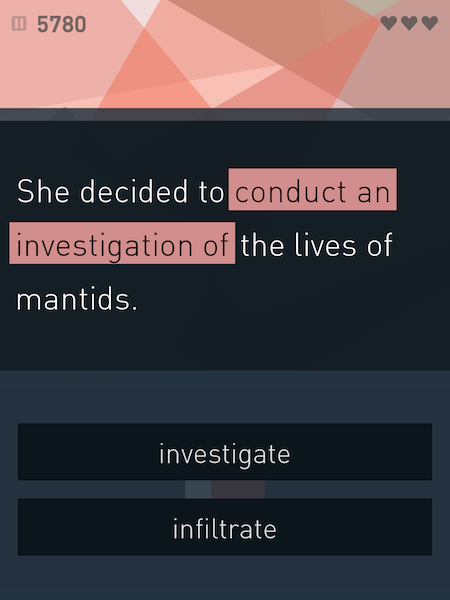 1) Able to: indicates that someone has the ability to do something. Simplify “able to” to “can”.
1) Able to: indicates that someone has the ability to do something. Simplify “able to” to “can”.
2) An adequate number of: a long phrase referring to an appropriate amount of something. Simplify “an adequate number of” to “enough”.
3) An appreciable number of: indicates a large amount of something. Simplify “an appreciable number of” to “several”.
4) An estimated: indicates an approximate number of something. Simplify “an estimated” to “about”.
5) By reason: refers to why something happened. Simplify “by reason” to “because”.
6) Conduct an investigation: passive form of the verb “investigate”. Simplify “conduct an investigation” to “investigate”.
7) Extend an invitation to: passive form of the verb “invite”. Simplify “extend an invitation to” to “invite”.
8) Have an adverse effect on: passive phrase meaning to produce an undesirable outcome. Simplify “have an adverse effect on” to “set back”.
9) In addition to: passive phrase indicating something extra. Simplify “in addition to” to “besides”.
10) In anticipation of: passive phrase referring to something done prior to an event. Simplify “in anticipation of” to “before”.
11) In connection with: a longer way to say concerning. Simplify “in connection with” to “about”.
12) It is crucial that you: a long phrase indicating something that is imperative. Simplify “it is crucial that you” to “you must”.
13) Made a statement that: lengthy phrase indicating that someone conveyed information. Simplify “made a statement that” to “said”.
14) Make reference to: passive phrase that indicates something being referenced. Simplify “make reference to” to “reference”.
15) Point of view: indicates how someone interprets a situation. Simplify “point of view” to “perspective”.
16) Realize a savings of: lengthy phrase that indicates an amount saved. Simplify “realize a savings of” to “save”.
Are you guilty of using any of these phrases? What other wordy phrases would you add to this list?
by Naomi L. | July 19, 2017 | Blog, Creative Writing, What If? Writing Prompts |
So lately I’ve been playing around with Canva, and I’ve come up with a new image for my “What If?” Writing Prompts segment! To be honest, I’ve felt for a while that it was time for a change, so today I’m debuting this new “social media friendly” image with a fresh set of fantasy and science fiction prompts! See what new stories you can write based on these ideas, and feel free to add more of your own! Enjoy!
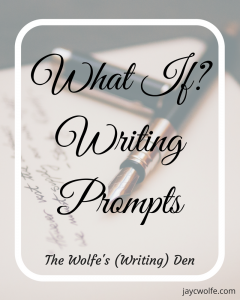 What if… in the future, wars were waged entirely by artificial intelligence with no human input?
What if… in the future, wars were waged entirely by artificial intelligence with no human input?
What if… you died, only to wake up and discover you’d been living in a virtual reality all along?
What if… you switched bodies with an extraterrestrial and had to find a way to switch back before it could destroy your home?
What if… you spent so much time in virtual reality that you couldn’t tell the difference between the real world and the virtual world anymore?
What if… you brought home a mysterious rock you found… that turned out to be a dragon egg?
Good luck writing more stories in science fiction and fantasy!
If you have any “What If?” writing prompt suggestions (for any theme), please feel free to share them in the comments below. Ideas I like may be featured in future “What If?” posts, with full credit and a link to your blog (if you have one)! Also, if you’ve written a piece based on an idea you’ve found here, be sure to link back to the respective “What If?” post. I would love to see what you’ve done with the prompt! Thank you!
by Naomi L. | July 12, 2017 | Blog, Creative Writing |
Yes, we’re already halfway through 2017! Amazing, isn’t it? Now that we’re in July, it’s once again time to assess our progress on our reading goals for the year. I’ll go first!
My 2017 Reading Goals
Like I did last year, I set a goal of ten books for the Goodreads 2017 Reading Challenge, a reasonable goal for a relatively slow reader like me. So far, I’ve met half my goal for the year! I’ve also noticed a trend of more books from my to-read list in January actually reaching my have-read collection, as well as more nonfiction books making the list (thanks in no small part to my pursuit of a freelancing career).
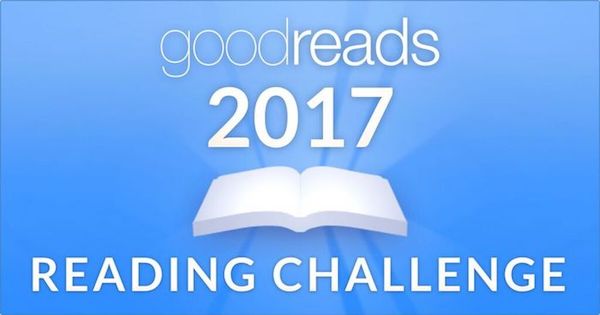
I plan to write a more detailed report on my 2017 reading goals at the end of the year. In the meantime, here’s a brief review of the books I’ve read so far, am currently reading, and still plan to read:
Books I’ve read so far
- The Hunger Games, by Suzanne Collins
- A Game of Thrones, by George R.R. Martin
- I Am Pusheen The Cat, by Claire Belton
- High Performance Paperback, by Ray Brehm and Jim Molinelli
- Fahrenheit 451, by Ray Bradbury
Books I’m currently reading
- 1984, by George Orwell
- Ready Player One, by Ernest Cline
- You Are A Writer, by Jeff Goins
- The Business of Writing & Editing, by Sagan Morrow
Books I still plan to read
- Wuthering Heights, by Emily Brontë
- Arrival, by Ted Chiang
- StarTalk, by Neil deGrasse Tyson
Your turn! Any reading goals you’re still working toward this year? Which ones have you completed so far?
by Naomi L. | July 5, 2017 | Blog, Creative Writing, What If? Writing Prompts |
Yesterday was Independence Day in the US, so here’s a special set of “What If?” Writing Prompts to celebrate! This week’s batch features more prompts in the history genre, specifically American history! See what historical tales you can spin from these ideas, and feel free to add more of your own! Have fun!
 What if… every state in the US were its own country?
What if… every state in the US were its own country?
What if… the “Wild West” hadn’t been settled in the 18th century?
What if… the stock market hadn’t crashed in 1929?
What if… the Japanese attack on Pearl Harbor had never happened?
What if… the US hadn’t undergone McCarthyism in the ’50s?
Good luck writing your own stories about American history!
If you have any “What If?” writing prompt suggestions (for any theme), please feel free to share them in the comments below. Ideas I like may be featured in future “What If?” posts, with full credit and a link to your blog (if you have one)! Also, if you’ve written a piece based on an idea you’ve found here, be sure to link back to the respective “What If?” post. I would love to see what you’ve done with the prompt! Thank you!
by Naomi L. | June 28, 2017 | Blog, Creative Writing, Featured |
Anyone who either is or has worked with an editor has had to deal with the common writing issue of active voice vs. passive voice. Any and every editor worth their salt will tell you to favor active voice, while writing in passive voice is just another bad habit you’ll have to learn to break. But why? What is active voice and what makes it so much better than its passive counterpart?

Finally, a fun way to check for passive voice!
(Image source: Grammarly Blog)
In a nutshell, an active voice sentence is when the subject does an action to the object, while passive voice is when the subject has an action done to it by the object. Both voices can be used to convey the same message, yet writing tips often advise favoring the former over the latter. This is especially true for fiction, which relies heavily on not only keeping readers engaged for an entire story, but evoking their emotions as you guide them through the world of your narrative.
So to help you create stronger and more appealing fiction, here are three reasons you should favor active over passive voice. Good luck!
1) Active voice is clearer, stronger, and more concise.

The longer you’ve been writing, the more you appreciate concise and direct language. In this modern-day barrage of knowledge, information that’s delivered and processed quickly tends to have a greater impact, so the fewer words you can use to convey a message, the better. One way to achieve this is by replacing passive voice statements with their active counterparts. Observe the difference:
Active: She loved him, but he rejected her.
Passive: He was loved by her, but she was rejected by him.
Notice how the active voice sentence is simpler yet much more powerful. Written concisely, the feelings of love and rejection between these characters become prominent and impactful, whereas the longer sentence appears convoluted and awkward, despite having the same meaning. By using fewer words, you can keep your writing direct and make your narrative stronger, which will result in more effective prose. Why let it be done by you when you can just do it?
2) Active voice sounds more natural.
Think about your favorite story, that book you enjoy so much you could read it over and over. Now think about why you love it. If “it speaks to me” is one of the first reasons to come to mind, then you’ve just made an excellent point to support active voice.
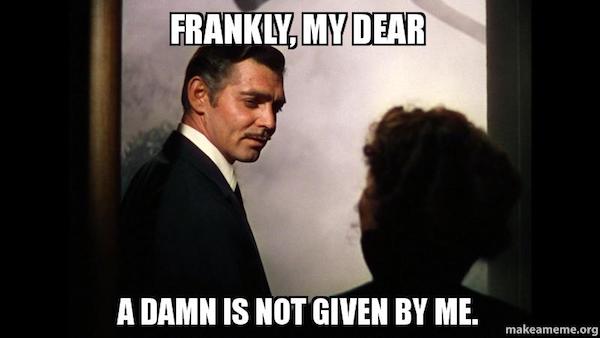
The types of writing that most resonate with us are the ones that sound familiar, that is, that mimic the way we speak. Active voice achieves this far more easily than passive voice because most of our speech is active. For example, when bragging to someone about an achievement, you wouldn’t tell them, “That was done by me”; you would say, “I did that!” Similarly, narrative should be as direct and “active” as spoken words. You want to draw your readers in and keep them hooked to the last word, and what better way to achieve that than by speaking directly to them?
3) Active voice keeps the momentum going.
One of the keys to good storytelling is to always keep the action moving forward. Even slower descriptive scenes should read smoothly, with new and relevant information in every line. Passive voice makes this difficult, as it has a way of dragging the pace of a story with unnecessary words and phrases. Don’t give your readers a motive to put your book down!
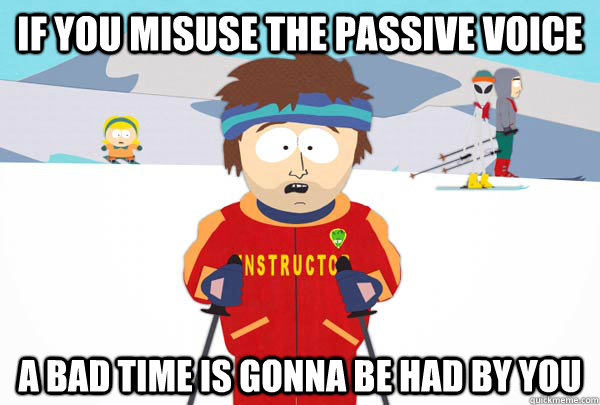
You don’t want your readers to have a bad time, do you?
Keep your prose clean by limiting passive voice to the few instances in which it works best:
- when you can’t say who performed the action;
- when you want to emphasize the action itself; and
- when you’re highlighting a general truth.
In all other cases, active voice will better maintain the momentum in your narrative, keeping your readers engaged through each new action until the end of the story. A good example of why this works is the Hero’s Journey: the hero answers the call to adventure, faces trials, confronts a great ordeal, collects the reward, and returns from his or her quest a new person. At every stage, the hero does something that leads to something else, standard cause and effect that propels the action forward. Apply this technique to your prose and the active voice will accomplish its most important goal: to make your writing active and interesting!
Perhaps you tend to overuse the passive voice without realizing (I know I’m still guilty of this), but luckily it’s an easy problem to fix. So the next time you edit one of your stories, keep an eye out for unnecessary passive sentences and replace them with their active parallels. Your readers will appreciate the effort!
What are your thoughts on active and passive voice? Are you guilty of not using active voice as frequently as you should?
by Naomi L. | June 21, 2017 | Blog, Creative Writing |
Creative inspiration can come from anywhere, and some of the best comes from the people you love most: your family. Every family member has their own unique qualities and abilities to contribute to your stories, but one in particular stands out for how much unconditional love and care she showers on you: your grandmother! Grandmas have plenty of love to give their grandchildren, so they can serve as great inspiration for grandparent characters in your stories!
So to honor someone special in my life, today’s post features three lessons you can only learn from your grandmother. Enjoy!
1) Grandchildren are meant to be spoiled.
 If there’s one thing grandparents are experts at, it’s spoiling their grandkids. Every family visit to my grandmother’s house includes platefuls of delicious homemade food and lots of fussing over us, mostly about how we’re “not eating enough”. She also makes a point of complimenting her granddaughters and telling us how much she adores us, and we can’t help but smile and tell her how much we love her too!
If there’s one thing grandparents are experts at, it’s spoiling their grandkids. Every family visit to my grandmother’s house includes platefuls of delicious homemade food and lots of fussing over us, mostly about how we’re “not eating enough”. She also makes a point of complimenting her granddaughters and telling us how much she adores us, and we can’t help but smile and tell her how much we love her too!
So if you’re writing a grandmother character, be sure to make her as doting as possible of her grandchildren. Have her share her best cooking with them, fuss over them without end, and constantly let them know how much she loves them and that they’re the greatest joys in her life. Grandmothers love spoiling their grandchildren, but that’s fine because we love being spoiled!
2) Nobody cooks like Grandma!
Going back to those “platefuls of food”, one thing I love about visiting my grandma is getting to enjoy the delicious snacks she makes! They’re something we always look forward to when we visit, since we get to enjoy them almost exclusively at family gatherings for special occasions. Her cooking is always a treat, so I’m glad her gift has passed on to my mother (and hopefully someday to me)!
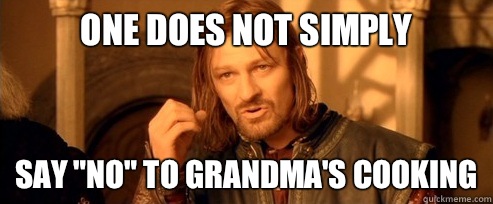
When writing fictional characters who are grandmothers, it’s common to give them the skills to cook and bake delicious treats, especially for their grandchildren! Remember, nobody cooks quite like Grandma does, so for Heaven’s sake, learn those family recipes! You’ll definitely miss them otherwise.
3) No matter how old you get, your grandmother will always see a child in you.
Every time my family and I see my grandma, some story from when I was little inevitably comes up. My grandmother loves reminiscing about when her grandchildren were small enough to be picked up and were doing something adorable every minute, and I can’t really blame her. I too love to remember the good old days of childhood; in fact, my inner child is one of the main reasons I’m a writer today!
If one of the important characters in your story is a grandmother, a good touch is to give her excellent storytelling abilities, as much of her youth as of more recent times when her grandchildren were little. Grandmothers enjoy telling stories of the people they love most, so grandchildren will naturally be a favorite subject for them! And if nothing else, telling your own story inspired by your grandmother may be the best way to show her how much you love her too!
What lessons have you learned from your grandmother? What other lessons would you add to this list?
Dedicated to my grandmother, whose love has always been a wonderful inspiration. Happy Birthday, Grandma! I love you!
 1) Able to: indicates that someone has the ability to do something. Simplify “able to” to “can”.
1) Able to: indicates that someone has the ability to do something. Simplify “able to” to “can”.
 What if… in the future, wars were waged entirely by artificial intelligence with no human input?
What if… in the future, wars were waged entirely by artificial intelligence with no human input?
 What if… every state in the US were its own country?
What if… every state in the US were its own country?



 If there’s one thing grandparents are experts at, it’s spoiling their grandkids. Every family visit to my grandmother’s house includes platefuls of delicious homemade food and lots of fussing over us, mostly about how we’re “not eating enough”. She also makes a point of complimenting her granddaughters and telling us how much she adores us, and we can’t help but smile and tell her how much we love her too!
If there’s one thing grandparents are experts at, it’s spoiling their grandkids. Every family visit to my grandmother’s house includes platefuls of delicious homemade food and lots of fussing over us, mostly about how we’re “not eating enough”. She also makes a point of complimenting her granddaughters and telling us how much she adores us, and we can’t help but smile and tell her how much we love her too!
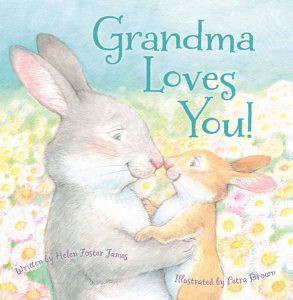

Recent Comments